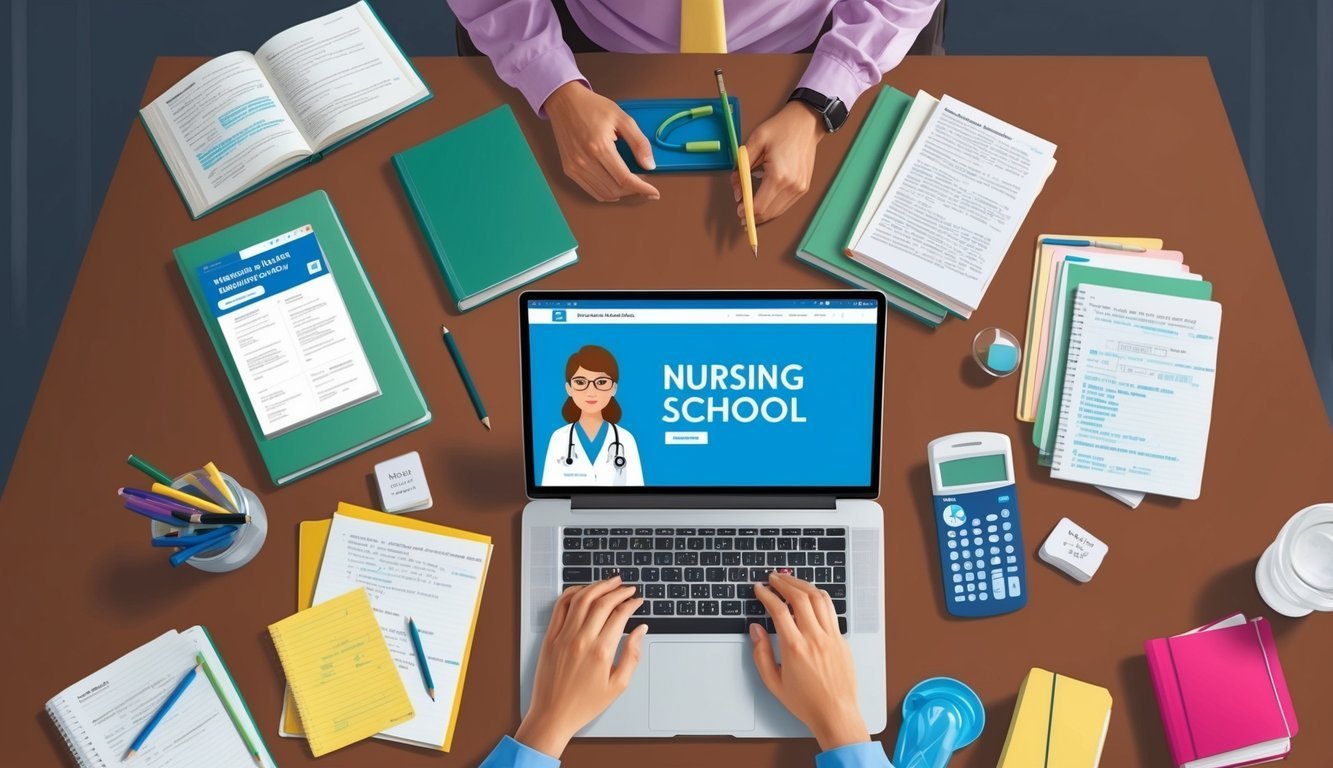Becoming a nurse can be a fulfilling and stable career choice.
You need to meet specific educational requirements, prepare for the application process, and understand your options for financial aid.
With the growing demand for healthcare professionals, now is an excellent time to pursue this noble path.
Starting this journey requires dedication and knowledge about the various nursing programs available.
Whether you’re aiming for an Associate Degree in Nursing (ADN) or a Bachelor of Science in Nursing (BSN), each path has its own set of prerequisites and expectations.
Knowing these details can help streamline your application process and set you up for success in your nursing career.
By gathering the right information and understanding what schools are looking for, you can greatly improve your chances of acceptance.
Preparation is key, and being aware of the financial aspects involved can help you plan effectively as you embark on this rewarding journey.
Key Takeaways
- Understand the requirements for different nursing programs.
- Focus on strategies that can enhance your application.
- Be aware of financial aid options to support your education.
Understanding the Types of Nursing Programs
Choosing the right nursing program is crucial for your career.
Two main pathways you can take are the Associate Degree in Nursing (ADN) and the Bachelor of Science in Nursing (BSN).
You may also explore advanced degrees later in your career.
Comparing ADN and BSN Degrees
The ADN program usually takes about two years to complete.
This option is often found at community colleges and focuses on the core skills needed for entry-level nursing roles.
In contrast, the BSN program is a four-year degree that provides a broader education.
It covers topics like leadership, community health, and research.
Many hospitals prefer hiring nurses with a BSN due to the added training.
| Degree Type | Duration | Key Focus Areas |
|---|---|---|
| ADN | 2 years | Clinical skills, basic nursing care |
| BSN | 4 years | Leadership, research, advanced nursing |
You may also consider RN-to-BSN programs if you already have an ADN and wish to advance your education.
Exploring Advanced Nursing Degrees
After completing your BSN, you can pursue further education, such as a Master of Science in Nursing (MSN).
This degree allows you to specialize in areas like Nurse Practitioner or Nurse Educator.
For those aiming for the highest level of nursing education, the Doctor of Nursing Practice (DNP) is available.
This program focuses on leadership and clinical practice.
Both MSN and DNP programs typically require a BSN for admission.
Here are some pathways:
- MSN: Focuses on advanced clinical skills and specialization.
- DNP: Prepares you for leadership roles and advanced clinical practice.
These advanced degrees can open doors to higher-paying positions and greater job responsibilities in healthcare.
Navigating the Application Requirements
Getting into nursing school involves understanding specific academic prerequisites and preparing a strong application.
Knowing these requirements will help you present yourself as a competent and dedicated candidate.
Meeting Academic Prerequisites
To become a nursing student, you must meet several academic prerequisites.
Most schools require a high school diploma or GED.
A competitive GPA is essential, often around 2.5 for ADN programs and higher for BSN programs.
You will also need to complete certain coursework, including:
- Biology
- Chemistry
- Microbiology
- Statistics
These subjects provide a strong foundation for your nursing education.
Check the specific requirements for each school, as they can vary.
Facilities may also ask for standardized test scores, so be prepared for possible entrance exams.
Ensure you understand all courses needed to strengthen your application.
Preparing Your Nursing School Application
When preparing your application, attention to detail is key.
A well-organized application packet can make a significant difference.
Here are some crucial elements:
- Personal Statement: Write a compelling essay that explains your motivation and goals.
- Letters of Recommendation: Secure strong recommendations, preferably from healthcare professionals or educators who can vouch for your abilities.
- Transcripts: Provide official transcripts from high school and any colleges attended.
Make sure to submit all required documents before the deadlines.
Double-check your application for completeness to ensure you meet all nursing school requirements.
Taking these steps will enhance your chances of acceptance and show your commitment to joining the nursing field.
Strategies for Admission Success
Successfully gaining admission to nursing school requires careful planning and strategy.
Focusing on your connections with admissions counselors and understanding accreditation is key to enhancing your application.
Connecting with Admissions Counselors
Connecting with admissions counselors can significantly boost your chances of getting into nursing school.
These professionals guide you through the application process and answer your questions.
Reach out early to establish a relationship.
When you contact them, ask about specific requirements, deadlines, and tips for a strong application.
Taking their advice can be invaluable.
Additionally, they can share insights about the school’s culture and the qualities they look for in applicants.
Be proactive and attend recruitment events or open houses.
This allows you to meet counselors in person and learn more about the programs.
Engaging directly can help you stand out from other candidates.
Understanding the Importance of Accreditation
Accreditation plays a critical role in nursing school selection.
Ensuring that your chosen program is accredited by bodies like the Commission on Collegiate Nursing Education (CCNE) is essential for future success.
Accreditation guarantees that the program meets high standards of education.
Attending an accredited nursing program can also affect your eligibility for financial aid and your ability to sit for licensure exams after graduation.
Schools with high acceptance rates often have accreditation, making them more competitive.
Take time to learn about each program’s accreditation status.
Analyze how it aligns with your educational and career goals.
Researching this aspect will help you make informed decisions about where to apply.
Examining the Financial Considerations
Paying for nursing school can be a significant concern.
Understanding the available financial aid options can help ease this burden and make your educational goals more achievable.
Exploring Financial Aid Options
Financial aid is crucial for many students pursuing nursing.
You should start by filling out the Free Application for Federal Student Aid (FAFSA).
This application helps determine your eligibility for federal grants, loans, and work-study programs.
Here are some options to consider:
| Type of Financial Aid | Description |
|---|---|
| Federal Grants | Free money that does not need to be repaid. |
| Federal Loans | Borrowed money to be repaid with interest. |
| Scholarships | Funds awarded based on merit or need. |
| Work-Study Programs | Part-time jobs to help cover education costs. |
You can also explore scholarships specific to nursing programs.
Many organizations offer funding based on academic performance, community service, or financial need.
Check out websites like Fastweb to find scholarships that match your profile.
Preparing for Nursing School Success

Getting ready for nursing school involves understanding both academic demands and clinical requirements.
You must stay focused on your studies while also preparing for hands-on experiences.
The following sections provide detailed information on what you need to succeed.
Academic Demands and Clinical Requirements
Nursing school is rigorous.
You will study subjects like anatomy and physiology, which are essential for understanding the human body.
Your coursework will often be divided into theoretical classes and practical labs.
Key Academic Courses:
- Nursing Fundamentals
- Pharmacology
- Microbiology
The clinical component involves working in real healthcare settings.
This hands-on experience is crucial for developing your skills.
You must complete a certain number of clinical hours under supervision to meet graduation requirements.
Achieving Licensing and Beyond
After finishing your nursing program, you must obtain your RN license.
This requires passing the NCLEX-RN examination.
The NCLEX pass rate varies by state, but preparing thoroughly can help you succeed.
Study materials and practice exams can be found online.
Many nursing graduates aspire to become nurse practitioners or nurse educators.
These roles often require additional schooling and training.
You may also consider specializing in various areas, which can lead to better job opportunities.
Achieving your RN license is the first step toward a rewarding career in nursing.
Frequently Asked Questions

You’ll want to understand several important aspects of getting into nursing school.
This section addresses common queries about prerequisites, application strategies, and eligibility requirements.
What are the prerequisite courses required for nursing school admission?
Most nursing programs require specific courses for admission.
Common prerequisites include:
| Course | Description |
|---|---|
| Biology | Introduction to human biology and anatomy |
| Chemistry | Basic concepts in chemistry |
| Anatomy and Physiology | Study of body systems and functions |
| Psychology | Understanding patients and behavior |
| Statistics | Basic data analysis and interpretation |
Each nursing school may have different requirements, so be sure to check with your desired program.
How can an individual with no healthcare experience improve their chances of being accepted into a nursing program?
If you lack healthcare experience, consider volunteering or shadowing professionals in the field.
This provides valuable insights and demonstrates your commitment to nursing.
Additionally, you can take relevant coursework or certifications.
These efforts show your dedication to learning and may strengthen your application.
What are the minimum high school academic requirements for prospective nursing students?
Typically, nursing programs require a high school diploma or GED.
Many schools look for a minimum GPA, often around 2.5 or higher on a 4.0 scale.
Specific course completion, like biology or chemistry, may also be necessary.
Always check the exact requirements of each program.
Is a degree from a previous college major considered for entry into a nursing program?
Yes, having a degree in another field can be beneficial.
However, nursing schools generally require you to complete the prerequisite courses.
Your previous degree may also be considered when evaluating your application, especially if it demonstrates strong academic performance.
What strategies can be employed to strengthen a nursing school application with a lower GPA?
If your GPA is below the program’s standards, you can still improve your application.
Consider the following:
- Strong Entrance Exam Scores: Perform well on nursing entrance exams like the TEAS or HESI.
- Relevant Coursework: Take additional courses to raise your GPA.
- Personal Statement: Write a compelling personal statement that explains your passion for nursing.
References from healthcare professionals can also make a positive impact.
How does one navigate the nursing school application process immediately after graduating from high school?
Start by researching nursing programs that interest you.
Be aware of application deadlines and gather all required materials, including transcripts and recommendation letters.
Consider preparing for entrance exams during this time.
Completing any necessary prerequisites before applying will strengthen your application.
Always reach out to admissions offices if you have any questions regarding the process.

